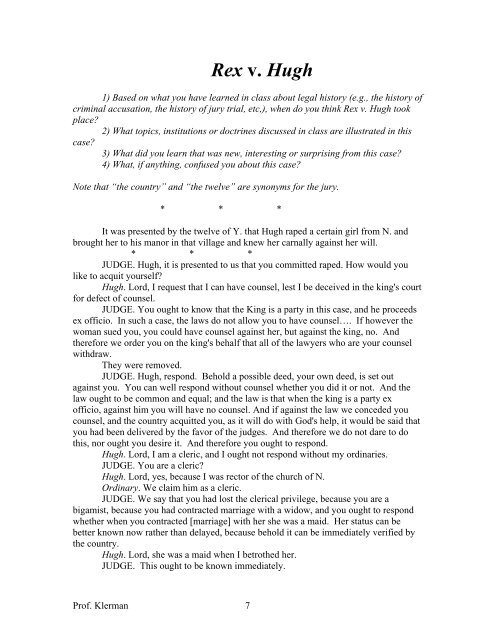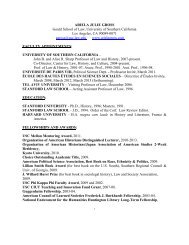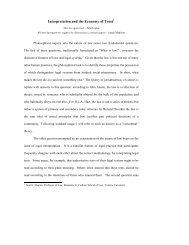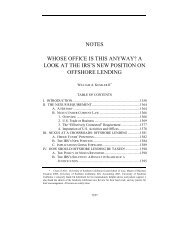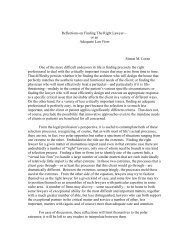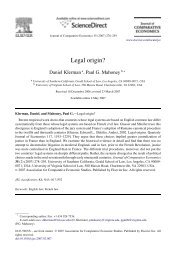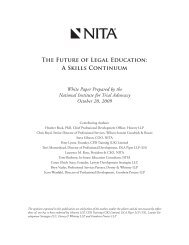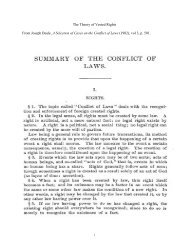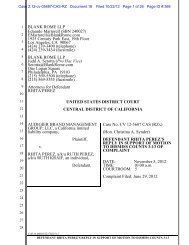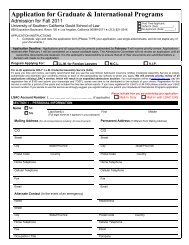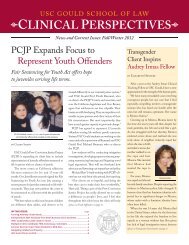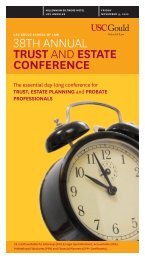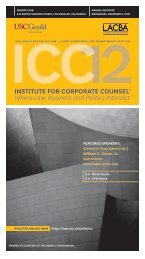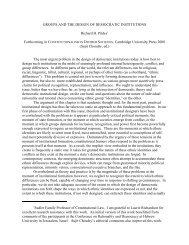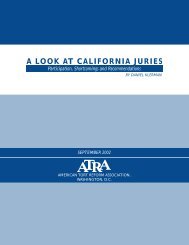Rex v. Hugh
Rex v. Hugh
Rex v. Hugh
Create successful ePaper yourself
Turn your PDF publications into a flip-book with our unique Google optimized e-Paper software.
<strong>Rex</strong> v. <strong>Hugh</strong><br />
1) Based on what you have learned in class about legal history (e.g., the history of<br />
criminal accusation, the history of jury trial, etc,), when do you think <strong>Rex</strong> v. <strong>Hugh</strong> took<br />
place?<br />
2) What topics, institutions or doctrines discussed in class are illustrated in this<br />
case?<br />
3) What did you learn that was new, interesting or surprising from this case?<br />
4) What, if anything, confused you about this case?<br />
Note that “the country” and “the twelve” are synonyms for the jury.<br />
* * *<br />
It was presented by the twelve of Y. that <strong>Hugh</strong> raped a certain girl from N. and<br />
brought her to his manor in that village and knew her carnally against her will.<br />
* * *<br />
JUDGE. <strong>Hugh</strong>, it is presented to us that you committed raped. How would you<br />
like to acquit yourself?<br />
<strong>Hugh</strong>. Lord, I request that I can have counsel, lest I be deceived in the king's court<br />
for defect of counsel.<br />
JUDGE. You ought to know that the King is a party in this case, and he proceeds<br />
ex officio. In such a case, the laws do not allow you to have counsel…. If however the<br />
woman sued you, you could have counsel against her, but against the king, no. And<br />
therefore we order you on the king's behalf that all of the lawyers who are your counsel<br />
withdraw.<br />
They were removed.<br />
JUDGE. <strong>Hugh</strong>, respond. Behold a possible deed, your own deed, is set out<br />
against you. You can well respond without counsel whether you did it or not. And the<br />
law ought to be common and equal; and the law is that when the king is a party ex<br />
officio, against him you will have no counsel. And if against the law we conceded you<br />
counsel, and the country acquitted you, as it will do with God's help, it would be said that<br />
you had been delivered by the favor of the judges. And therefore we do not dare to do<br />
this, nor ought you desire it. And therefore you ought to respond.<br />
<strong>Hugh</strong>. Lord, I am a cleric, and I ought not respond without my ordinaries.<br />
JUDGE. You are a cleric?<br />
<strong>Hugh</strong>. Lord, yes, because I was rector of the church of N.<br />
Ordinary. We claim him as a cleric.<br />
JUDGE. We say that you had lost the clerical privilege, because you are a<br />
bigamist, because you had contracted marriage with a widow, and you ought to respond<br />
whether when you contracted [marriage] with her she was a maid. Her status can be<br />
better known now rather than delayed, because behold it can be immediately verified by<br />
the country.<br />
<strong>Hugh</strong>. Lord, she was a maid when I betrothed her.<br />
JUDGE. This ought to be known immediately.<br />
Prof. Klerman 7
And he asked the twelve if <strong>Hugh</strong> [married his wife when she was a widow]. The<br />
twelve said on oath that she was a widow when Lord <strong>Hugh</strong> contracted [marriage] with<br />
her. But it should be noted that they were not sworn again, because they were sworn first.<br />
JUDGE. And thus the court considers that you ought to respond as a layman, and<br />
do you consent to these worthy men of the twelve, because we know that they do not<br />
want to lie for us.<br />
<strong>Hugh</strong>. Lord, I was accused by them; therefore I will not consent to them. In<br />
addition, Lord, I am a knight, and I ought not to be judged except by my peers.<br />
And knights were named. And he was asked wither he wanted to set forward any<br />
challenges against them.<br />
<strong>Hugh</strong>. Lord, I do not consent to them, you can take whatever inquest you want ex<br />
officio, but I will not consent<br />
JUDGE. Lord <strong>Hugh</strong>, if you will to consent to them, with God's help, they will<br />
decide for you, if you will consent to them. And if you want to reject the common law,<br />
you will bear the penalty ordained for it, that is "one day you will eat and the other you<br />
will drink; and on the day you drink you will not eat, and the reverse; and you will eat<br />
barley bread and not with salt, and water [not wine or beer] etc.", explaining to him at<br />
length whence it would not be good to die in this way, but it would be better to consent to<br />
them.<br />
<strong>Hugh</strong>. I will consent to my peers, but not to the twelve through whom I was<br />
accused. You ought to hear my challenges against them.<br />
JUDGE. Freely. Let the challenges be read; but if you know any reason why they<br />
ought to be removed, say it in a single voice or in writing.<br />
<strong>Hugh</strong>. Lord, because I do not know how to read, I request my counsel.<br />
JUDGE. No, because it touches the lord King.<br />
<strong>Hugh</strong>. You ought to have the challenges and you ought to read them.<br />
JUDGE. No, because they ought to be set out by your mouth.<br />
<strong>Hugh</strong>. I don't know how to read them.<br />
JUDGE. How is it that you wanted to help yourself with the clerical privilege, and<br />
now you don't know how to read your challenges.<br />
<strong>Hugh</strong> stood silent as if confused.<br />
JUDGE. Don't be stupified, now is the time to speak.<br />
JUDGE (to Lord N. de Leicester). Do you want to read Lord <strong>Hugh</strong>'s challenges?<br />
Lord N. Lord, may I have the paper that he has in his hands?<br />
This was allowed.<br />
Lord N. Many challenges are named here against many people, do you want me<br />
to read them publicly?<br />
JUDGE. No, rather you should read them to the prisoner secretly, because they<br />
ought to be stated by his mouth.<br />
And it was done in this way. When they had been propounded by his mouth,<br />
because there were found to be truly challenged, those against whom he had propounded<br />
were removed from the inquest.<br />
JUDGE. We accuse Lord <strong>Hugh</strong> of rape of a certain woman. He denies. He was<br />
asked how he wants to acquit himself; he said through the country. For good or evil, he<br />
put himself on you. Therefore we order you in virtue of your oath to tell us whether Lord<br />
<strong>Hugh</strong> raped this woman or not.<br />
Prof. Klerman 8
The Twelve. We say that she was raped by force by Lord <strong>Hugh</strong>'s men.<br />
JUDGE. Did <strong>Hugh</strong> consent to the deed or not?<br />
The Twelve. No<br />
JUDGE. Did they now her carnally?<br />
The Twelve. Yes.<br />
JUDGE. Against the woman's will or with her consent?<br />
The Twelve. With her consent<br />
I believed that what ought to be here was later lost.<br />
JUDGE. Lord <strong>Hugh</strong>, because they acquit you, we acquit you.<br />
[Original in Latin. edited and translated by Prof. Klerman. ]<br />
Prof. Klerman 9
Sir Thomas Smith, De Republica Anglorum (1560s)<br />
1) How is Smith’s description of trial similar to <strong>Rex</strong> v. <strong>Hugh</strong>?<br />
2) How is it different?<br />
3) What did you see that was interesting or surprising?<br />
* * *<br />
In the towne house, or in some open or common place, there is a tribunall or place of<br />
judgement made aloft upon the highest bench, there sitteth the two or three Judges which<br />
be sent downe in Commission in the midst. … Then the cryer crieth, and commaundeth<br />
silence. One of the Judges briefely telleth the cause of their comming, and giveth a good<br />
lesson to the people. Then the prisoners are called for by name, and bidden to aunswere<br />
to their names. … There the clarke speaketh first to one of the prisoners: A.B. come to<br />
the barre, hold up thy hand. The clarke goeth on: A.B. thou by the name of A.B. of such a<br />
towne, in such a countie, art endicted, that such a day, in such a place, thou hast stolen<br />
with force and armes an horse, which was such a ones, of such a colour, to such a valor,<br />
and carried him away feloniouslie, and contrarie to the peace of our soveraigne Ladie the<br />
Queene. What sayest thou to it, art thou guiltie or not guiltie? If he will not aunswere, or<br />
not aunswere directly, guiltie or not guiltie, after he hath beene once or twise so<br />
interrogated, he is judged mute, that is dumme by contumacie, and his condemnation is to<br />
be pressed to death…<br />
If he pleade not guiltie, as commonly all theeves, robbers, and murtherers doe, …<br />
the Clarke asketh him how he will be tryed, and telleth him he must saie, by God and the<br />
Countrie, for these be the words formall of this triall after Inditement, and where the<br />
Prince [the King] is partie: if the prisoner doe say so, I will be tryed by God and the<br />
Countrie, then the Clarke replyeth, Thou hast beene endicted of such a crime, &c. Thou<br />
hast pleaded not guiltie: being asked how thou wilt be tryed, thou hast aunswered by God<br />
and by the Countrie. Loe these honest men that be come here, be in the place and stead of<br />
thy Countrie: and if thou hast any thing to say against any of them, looke upon them well<br />
and nowe speake, for thou standest upon thy life and death. Then calleth he in the first<br />
[juror]: B.C. come to the booke, and so giveth him an othe to goe uprightlie betwixt the<br />
Prince and the prisoner, &c. If the prisoner objecteth nothing against him, he calleth an<br />
other, and so an other, till there be xii. or above: and for the most part the prisoner can<br />
say nothing against them, for they are chosen but for that day, and are unknowen to him,<br />
nor they know not him, as I said before being substantial yeomen, that dwell about the<br />
place, or at the least in the hundred, or neere where the felonie is supposed to be<br />
committed, men acquainted with daily labour and travaile, and not with such idle menne,<br />
as be readie to doe such mischiefes.<br />
Prof. Klerman 10
When the enquest is full .. [t]he crier … sayth aloude: If any can give any<br />
evidence, or can saie any thing against the prisoner, let him come nowe, for he standeth<br />
upon his deliverance. … The Judge first after they [the witnesses] be sworne, asketh first<br />
the partie robbed, if he knowe the prisoner, and biddeth him looke upon him: he saith<br />
yea, the prisoner sometime saith nay. The partie pursuivaunt [victim/prosecutor] [says] I<br />
knowe thee well ynough, thou robbest me in such a place, thou beatest mee, thou tookest<br />
my horse from mee, and my purse, thou hadst then such a coate and such a man in thy<br />
companie: the theefe will say no, and so they stand a while in altercation, he telleth al that<br />
he can say: after him likewise all those who were at the apprehension of the prisoner, or<br />
who can give any indices or tokens which we call in our language evidence against the<br />
malefactor. When the Judge hath heard them say inough, he asketh if they can say any<br />
more: if they say no, then he turneth his speeche to the enquest [jury]. Good men (saith<br />
he) ye of the enquest, ye have heard what these men say against the prisoner, you have<br />
also heard what the prisoner can say for himselfe, have an eye to your othe, and to your<br />
duetie, to God and the Prince and doe that which God shall put in your mindes to the<br />
discharge of your consciences, and marke well what is saide. Thus sometime with one<br />
enquest is passed to the number of ij. or iij. prisoners: For if they should be charged with<br />
more, the inquest will say, my Lord, we pray you charge us with no more, it is ynough for<br />
our memorie. Many times they are charged but with one or two. At their departing, they<br />
have in writing nothing given them, but the enditement, the clarke repeating to them the<br />
effect of it, and shewing more, that if they finde him guiltie, they shall enquire what<br />
goods, lands, and tenements, the saide person had at the time of the felonie committed:<br />
and if they finde any, they shall bring it in: if no, they shal say so. If they finde him not<br />
guiltie, they shall enquire whether he fled for the felonie or no.<br />
And there is a bailife to waite upon them, and to see that no man doe speake with<br />
them, and that they have neither bread, drinke, meate, ne fire brought to them, but there<br />
to remaine in a chamber together till they agree…. By that time that the enquests for the<br />
prisoners be dispatched, it is commonlie dinner time, the Judges and Justices goe to<br />
dinner, and after dinner returne to the same place: … The enquests have no sooner agreed<br />
upon their charge one way or other, but they tell the Bailife, and pray to be heard, and<br />
considering that they be themselves all this while as prisoners as I saide before, it is no<br />
marvell. The prisoners be sent for againe to the barre, the enquest which hath agreed, is<br />
called for eche one of the Jurie by his name, to which he answereth. Then the clarke<br />
asketh if they be agreed, and who shall speake for them. One or moe saith yea. He that<br />
speaketh for them all is called for foreman, and commonlie it is he that is first sworne:<br />
then the prisoner is bidden to holde up his hande. The clarke saith unto him, Thou art<br />
endicted by the name of A. of such a place, &c. being therefore arraigned thou pleadest<br />
thereto not guiltie, being asked howe thou would be tryed, thou saydst by God and thy<br />
countrie. These honest men were given to thee by God and thy Prince for thy Countrey:<br />
Hearken what they say. Then he asketh of the enquest, what say you? Is he guiltie or not<br />
guiltie? The foreman maketh aunswere in one worde, guiltie, or in two, not guiltie: the<br />
one is deadlie, the other acquiteth the prisoner. So that neither Judge nor Justice hath to<br />
doe, or can reverse, alter or chaunge that matter. …<br />
Of him whom the xij. men pronounce guiltie, the Judge asketh what he can now<br />
say for himself: if he can reade, he demaundeth his Clergie. … If the condemned man<br />
demandeth to be admitted to his booke, the Judge commonly giveth him a Psalter, and<br />
Prof. Klerman 11
turneth to what place he will. The prisoner readeth as well as he can (God knoweth<br />
sometime very slenderly:) then asketh of the Bishops commissarie, legit ut clericus [Can<br />
he read like a cleric]? The commissarie must say legit [he reads] or non legit [he does not<br />
read], for these be wordes formall, and our men of Lawe be verie precise in their words<br />
formall. If he say legit, the Judge proceedeth no further to sentence of death: if he say<br />
non, the Judge forthwith, or the next day proceedeth to sentence, which is doone by word<br />
of mouth onelie:<br />
[From http://www.constitution.org/eng/repang.htm, Ch 23. Edited by Prof. Klerman]<br />
Prof. Klerman 12


